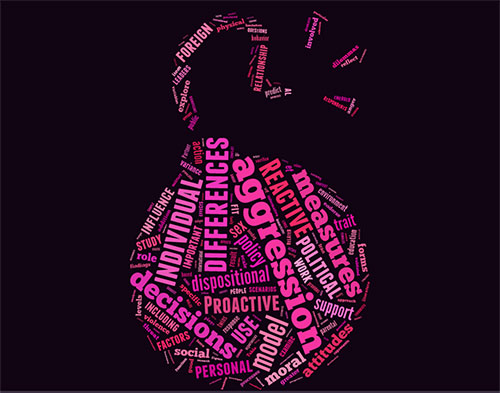 PROVIDENCE, R.I. [Brown University] — Can individual tendencies toward physical aggression lead someone to support aggressive foreign policy interventions? The answer may be yes, a new study says.
PROVIDENCE, R.I. [Brown University] — Can individual tendencies toward physical aggression lead someone to support aggressive foreign policy interventions? The answer may be yes, a new study says.
The research found that individuals who scored higher on a commonly used scale that measures aggression were also “more likely to support aggressive foreign policy interventions and displayed a more utilitarian moral calculus than those who scored lower on this scale.”
The study, published in the journal Aggressive Behavior, looks at the link between personal physical aggression, which the researchers note is genetically influenced, and individual attitudes toward foreign policy and moral choices in complicated contexts.
“We wanted to explore the relationship between individual tendencies to engage in physical aggression in interpersonal situations and attitudes toward larger foreign policy issues and broader moral choices,” said co-author Rose McDermott, the David and Marianna Fisher University Professor of International Relations at Brown University.
“Behaviors once thought to be purely social, such as morality, political values and economic decisions, are now known to result from the combination and interaction of genes and environments,” McDermott wrote with her co-author, political scientist Peter K. Hatemi of Pennsylvania State University.
McDermott and Hatemi also found a difference between men and women. For men, individual differences in levels of physical aggression were accounted for by a combination of genetic and environmental factors; for women, individual differences in levels of physical aggression were the product of social and environmental factors alone.
Refining a method
In the past, the relationship between “personal proclivities toward aggression and public manifestations in foreign policy emerged from biographical and historiographic perspectives of leader behavior,” the authors wrote. This ranged from studies using the Freudian notion of projection — how political leaders could project their needs, desires and aggressive drives onto the larger political world — to looking at the link between personal aggression among U.S. State Department leaders and their advocacy for the use of force.
McDermott and Hatemi note the limitations of such studies, including their anecdotal nature, and point out that the recent introduction of behavior-genetic approaches to analyze social decisions adds both opportunity and complexity to the understanding of what drives political and social choices.
“Yet the importance of individual differences in aggression for attitudes toward foreign policy or context-laden moral choices, such as sacrificing the lives of some for the greater good of many, has yet to be fully explored,” the authors wrote.
So they aimed to begin to specify the mechanisms by which individual tendencies translate into political action and to consider the impact of “social, environmental or genetic” factors. Understanding the sources of variation in individual behavior, alone or in aggregate, the authors wrote, is an important tool for understanding the origins of political violence.
Measuring aggression and political decision-making
The researchers studied a group of 586 Australians, which included 250 pairs of twins. The sample group took the Buss and Perry’s Aggression Questionnaire and was then presented with a series of hypothetical vignettes. Respondents were asked to make decisions based on two types of threats, one immediate, and one potential, both of which involved the use of military force abroad.
They were also asked what they would do in situations where sacrificing one life would save many, including a scenario in which they must imagine they had fled a ship consumed in flames and were in an overcrowded lifeboat in rough seas with an injured person who would not survive. Would the respondent throw that person overboard, so the lifeboat would stay afloat and preserve the lives of everyone else on it?
Finally, the sample group was asked about their policy positions on defense, including questions about the Iraq War and the War on Terror.
McDermott and Hatemi found that physical aggression “had a significant association with foreign policy and moral choices, but only under conditions of direct threat or where sacrificing the lives of the few would save the many and physical action was required.”
The trait of physical aggression did not impact more general national defense values or more general potential threats, the authors wrote.
They also found that men were more likely than women to sacrifice one for the good of the many, and that more educated individuals were less likely to support aggressive action abroad, but that education had little impact on moral choices.
Implications
The researchers said the fact that different findings for men and women requires further exploration. One possibility is that “environmental, institutional and social forces are so strong as to prevent the expression” of trait physical aggression in women, or, alternatively, that the biological and social mechanisms underpinning trait physical aggression in men and women may differ.
The authors wrote that these findings could help direct future studies on how different stresses on men and women may impact how or whether aggression is expressed; they also suggest that the best strategies for negotiating, diffusing or preventing aggressive behavior may differ for males and females.
The results can impact methods for identifying individuals who may opt for more aggressive policies, McDermott and Hatemi noted. They can also improve the public’s ability to make informed choices in their own decisions as well as in choosing candidates whose attraction to aggressive policies will impact the broader public.